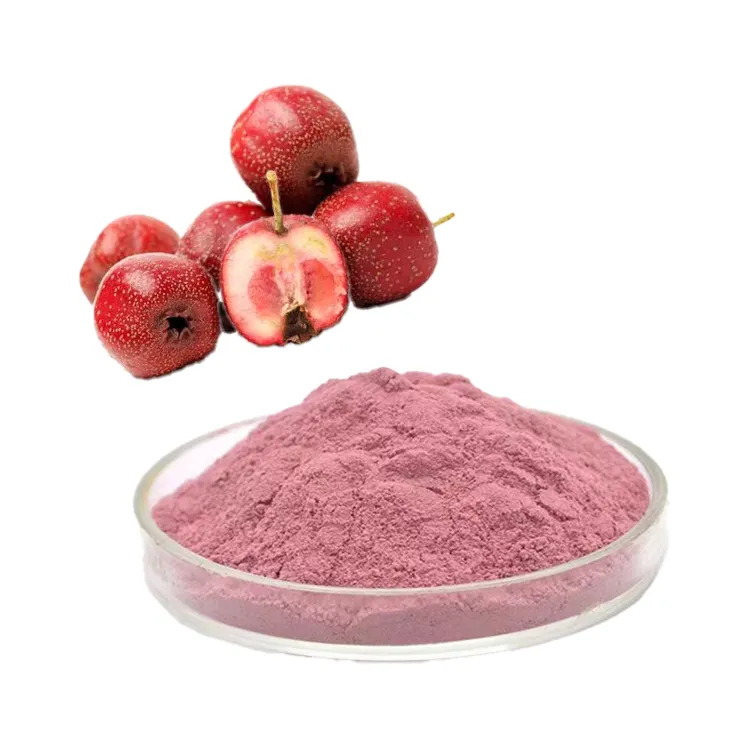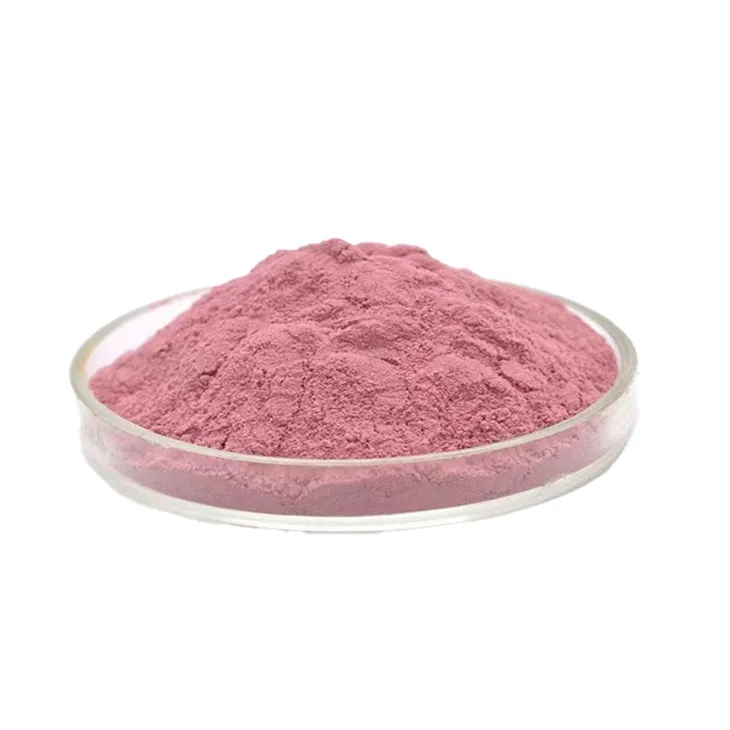- 0086-571-85302990
- sales@greenskybio.com
Is hawthorn powder beneficial for diabetes? Are these all safe and applicable for diabetic patients?
2024-11-14

1. Introduction
Diabetes has become a global health epidemic, affecting millions of people worldwide. In the search for natural remedies to manage diabetes, many turn to substances like Hawthorn powder. Hawthorn, a plant with a long history of use in traditional medicine, has been touted for various health benefits. But when it comes to diabetes, the question remains: is it truly beneficial, and is it safe for diabetic patients? This article will explore these aspects in detail.

2. Hawthorn powder and Blood Sugar Regulation
2.1. Potential Mechanisms
Hawthorn contains certain compounds that may have an impact on blood sugar levels. Polyphenols present in hawthorn are believed to play a role. These polyphenols may enhance insulin sensitivity. Insulin is the hormone responsible for regulating blood sugar, and when cells become more sensitive to it, they can take up glucose more effectively, thus helping to lower blood sugar levels.
Another possible mechanism is through the modulation of carbohydrate metabolism. Hawthorn may influence the enzymes involved in the breakdown and absorption of carbohydrates. By affecting these processes, it could potentially slow down the release of glucose into the bloodstream, preventing rapid spikes in blood sugar.
2.2. Research Findings
Several studies have been conducted on the relationship between hawthorn and blood sugar. Some animal studies have shown promising results. For example, in diabetic rats, Hawthorn Extract supplementation led to a reduction in fasting blood glucose levels over a period of time. However, it is important to note that animal studies do not always directly translate to humans.
Human studies on the topic are relatively limited. Some small - scale human trials have suggested a mild improvement in blood sugar control in diabetic patients who consumed Hawthorn powder regularly. But more large - scale, well - designed clinical trials are needed to confirm these initial findings.

3. Other Health Benefits of Hawthorn Powder for Diabetics
3.1. Cardiovascular Health
Diabetic patients are at a higher risk of developing cardiovascular diseases. Hawthorn has been traditionally used to support heart health. It may help in reducing blood pressure, which is often elevated in diabetics. By dilating blood vessels, hawthorn powder can potentially lower blood pressure levels, reducing the strain on the heart and blood vessels.
It also has antioxidant properties. Oxidative stress is increased in diabetes, and this can damage blood vessels and cells. The antioxidants in hawthorn powder can combat oxidative stress, protecting the cardiovascular system. Additionally, hawthorn may improve lipid profiles in diabetics by reducing levels of bad cholesterol (LDL) and increasing levels of good cholesterol (HDL).
3.2. Digestive Health
Hawthorn powder may also offer benefits for digestive health in diabetic patients. Diabetes can sometimes lead to digestive problems such as gastroparesis (delayed stomach emptying). Hawthorn has been shown to have a mild stimulatory effect on the digestive system. It can help improve digestion and relieve symptoms such as bloating and indigestion.
Furthermore, the anti - inflammatory properties of hawthorn may be beneficial for the gut. Inflammation in the gut can disrupt the normal gut microbiota balance, which is important for overall health. By reducing inflammation, hawthorn powder may contribute to a healthier gut environment.

4. Safety Considerations for Diabetic Patients
4.1. Interaction with Medications
One of the main safety concerns for diabetic patients using hawthorn powder is its potential interaction with medications. Diabetics often take medications such as metformin or insulin to control their blood sugar. Hawthorn may interact with these medications, either enhancing or reducing their effectiveness.
For example, if hawthorn enhances the effect of insulin, it could lead to hypoglycemia (low blood sugar), which can be dangerous. On the other hand, if it reduces the effectiveness of medications, blood sugar levels may not be properly controlled. Therefore, it is crucial for diabetic patients to consult their healthcare provider before starting hawthorn powder supplementation.
4.2. Allergic Reactions
Some individuals may be allergic to hawthorn. Allergic reactions can range from mild symptoms such as skin rashes and itching to more severe reactions like difficulty breathing and anaphylaxis. Diabetic patients should be aware of the possibility of an allergic reaction and stop using hawthorn powder if any adverse symptoms occur.
4.3. Quality and Purity of Hawthorn Powder
The quality and purity of the hawthorn powder are also important factors to consider. Poor - quality hawthorn powder may contain contaminants or impurities that could be harmful. It is advisable to purchase hawthorn powder from reliable sources, preferably those that adhere to strict quality control standards.

5. Conclusion
In conclusion, hawthorn powder shows potential benefits for diabetes in terms of blood sugar regulation, cardiovascular health, and digestive health. However, the evidence is not yet conclusive, and more research is needed. Diabetic patients must be cautious when considering using hawthorn powder due to potential interactions with medications, allergic reactions, and concerns about quality. It is always best for diabetic patients to consult their healthcare provider before incorporating hawthorn powder into their diabetes management plan.
FAQ:
Q1: Can hawthorn powder directly lower blood sugar in diabetic patients?
There is currently no conclusive evidence to suggest that hawthorn powder can directly and significantly lower blood sugar levels in diabetic patients. While hawthorn contains certain components that may have some influence on metabolism, it is not a substitute for standard diabetes medications in terms of blood - sugar - lowering effects.
Q2: Are there any components in hawthorn powder that are beneficial for diabetes?
Hawthorn contains flavonoids, organic acids and other components. Flavonoids have antioxidant properties which may help in reducing oxidative stress associated with diabetes. However, this does not mean that it can single - handedly manage diabetes. These components may play a supplementary role in overall health improvement related to diabetes.
Q3: Is it safe for diabetic patients to consume hawthorn powder?
Generally, in moderate amounts, hawthorn powder is considered safe for diabetic patients. However, some diabetic patients may also have other health conditions such as gastrointestinal problems. Hawthorn powder may have an impact on digestion, so it is necessary to pay attention to individual reactions. Also, it should not be used as a replacement for medical treatment without consulting a doctor.
Q4: How should diabetic patients use hawthorn powder?
If diabetic patients want to use hawthorn powder, it is best to consult a doctor or a professional in the field of nutrition first. They can determine the appropriate dosage based on the patient's overall health condition, blood sugar level and other medications being taken. Usually, it can be added to food or drinks in a proper amount.
Q5: Can hawthorn powder replace diabetes medications?
No. Diabetes medications are specifically designed to control blood sugar levels through scientific research and clinical trials. Hawthorn powder does not have the same level of efficacy and safety profile as diabetes medications. It can only be considered as a complementary approach, not a replacement.
Related literature
- The Role of Hawthorn in Health and Disease"
- "Potential Benefits of Natural Substances in Diabetes Management: A Review"
- ▶ Hesperidin
- ▶ citrus bioflavonoids
- ▶ plant extract
- ▶ lycopene
- ▶ Diosmin
- ▶ Grape seed extract
- ▶ Sea buckthorn Juice Powder
- ▶ Beetroot powder
- ▶ Hops Extract
- ▶ Artichoke Extract
- ▶ Reishi mushroom extract
- ▶ Astaxanthin
- ▶ Green Tea Extract
- ▶ Curcumin Extract
- ▶ Horse Chestnut Extract
- ▶ Other Problems
- ▶ Boswellia Serrata Extract
- ▶ Resveratrol Extract
- ▶ Marigold Extract
- ▶ Grape Leaf Extract
- ▶ blog3
- ▶ blog4
- ▶ blog5
-
Organic Tongkat Ali extract powder factory.
2024-11-14
-
How to make powder with ashwagandha extract.
2024-11-14
-
Rosehip extract manufacturers from China.
2024-11-14
-
The best cat's claw extract in nature.
2024-11-14
-
Chinese Dandelion Leaf Extract Suppliers.
2024-11-14
-
Pomegranate Extract
2024-11-14
-
Yam Extract
2024-11-14
-
Polygonum multiflorum extract
2024-11-14
-
Longan Extract
2024-11-14
-
Chia Seed Powder
2024-11-14
-
Alisma Extract
2024-11-14
-
Bayberry Extract
2024-11-14
-
Artichoke Leaf Extract
2024-11-14
-
Bitter Melon Extract
2024-11-14
-
Kidney Bean Extract
2024-11-14





















